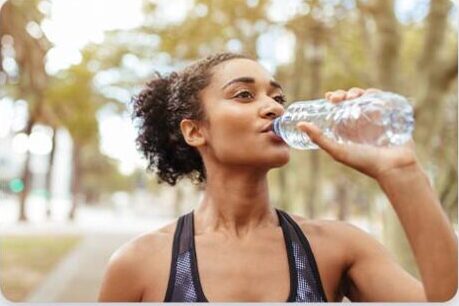The Many Benefits of Proper Hydration

The peak of summer is an ideal time to feature hydration benefits and ways to incorporate hydrating foods and drinks into our daily routines with Chef Marshall O’Brien, one of our nutrition experts.
It’s all about balance
“Hydration is optimization,” says Marshall. “It’s when your body has equilibrium from a body core temperature standpoint, and all your vital organ systems are working efficiently.” Among the many benefits of hydration are your energy levels, mental cognition, digestion, and flexibility. “It can also help with your hair, your skin, and your nails, making them more resilient.”
Surprisingly, “people are often mildly dehydrated year-round and don’t even realize it,” Marshall explains. The main culprit is inadequate water intake. “The standard guideline is to drink approximately half your body weight in fluid ounces,” and to concentrate water intake on the first half of the day. “It is best to be done hydrating by 3:00 or 4:00 in the afternoon, or the latest by dinnertime around 6:00. You don’t want to be drinking too much fluid at the end of the day or you will need to get up during the night to use the restroom. That will interrupt your sleep and compromise your health.”
For someone who weighs 150 pounds, that’s 75 ounces of water per day. “It may seem like a lot at first, but once your body calibrates to that level of hydration, your system will adjust.” Another helpful tip is to “think like you’re hydrating for tomorrow,” says Marshall. “It takes 8-12 hours to be adequately hydrated and 18-24 hours to be optimally hydrated. So If you’re going to be at the beach, or camping, or hiking tomorrow, hydrate today to be prepared for tomorrow’s activities.”
What are the signs of dehydration?
“When you are mildly dehydrated, you will have lost almost one percent of water in body weight and your body won’t show signs of thirst. In this state, you’ll be cognitively impaired – irritable, forgetful, and less able to make accurate decisions. You may also suffer from headaches or constipation. And it only gets worse when it’s hot.”
Hydrating foods and beverages
It’s not just water or liquids that offer hydrating benefits. As Marshall explains in the Wellbeats class Hydrating Foods, “Tomatoes, bell peppers, and broccoli contain more than 90% water.” Use them generously in your summer salads. “Hydrating foods that work for you are fruits, vegetables, and whole grains that absorb water. Oatmeal is a classic example. And soups and stews are other great hydrating foods.”
On the beverage side, “water is ultimately the best hydrating liquid you can have.” Marshall recommends using a water bottle with an infuser so you can add fruits and herbs to add flavor along with hydrating benefits.
A note for athletes
“Everybody needs a different level of hydration,” says Marshall. “It depends on the person’s weight and activity level and whether they sweat a lot. Sodium, potassium, and magnesium are electrolytes that need to be replenished after a vigorous workout to help your vital organ systems operate efficiently.” Some sports drinks can be a good source for this but avoid those with added sugars and sweeteners. “I’ve been using one called LMNT.”
One final Wellbeats class can give you additional ideas: See Importance of Hydration with Christina.
Have a great rest of the summer – and stay hydrated!